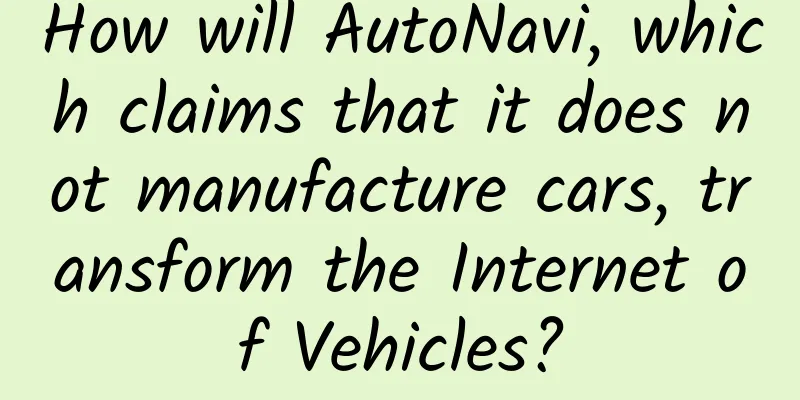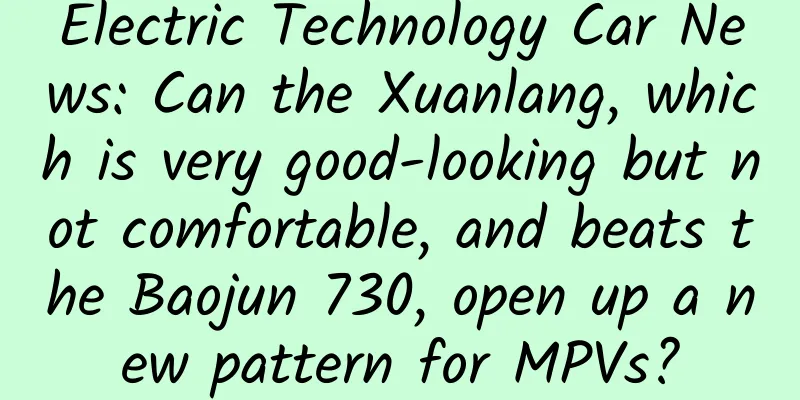How will AutoNavi, which claims that it does not manufacture cars, transform the Internet of Vehicles?

|
Before November 2, if there was any news about AutoNavi and cars, it was the widely circulated statement by Yu Yongfu, president of AutoNavi Group, that "AutoNavi completed its annual task ahead of schedule and will reward employees with luxury cars." From the internal letter released by Yu Yongfu at that time, we can read that AutoNavi has developed smoothly after joining Alibaba, and officially launched the "One AutoNavi, One Cloud, Multiple Screens" strategy, integrating AutoNavi's Internet of Vehicles business into the system. 20 days later, AutoNavi officially announced the "One AutoNavi (AMAP)" strategy today, and will focus on investing in and developing its automotive business in the next stage. In the face of various speculations from the outside world about AutoNavi's car-making, Wei Dong, president of AutoNavi's automotive business unit, also gave a clear answer: "AutoNavi will not build cars. Those who build cars are our partners because they understand mechanics, control, and safety better." Developing an integrated engine and integrating mobile phone and car machine businesses will become the focus in the future. What exactly is the Internet of Vehicles? Currently, the automobile industry is at the peak of technological innovation, and innovation is not limited to the mechanical components of automobiles. Intelligent and networked software development has become a new trend and direction in automobile development. The concept of Internet of Vehicles has been ignited in traditional manufacturing and technology industries around the world. Similarly, the Internet of Vehicles has gradually become popular in China. More than one Internet manufacturer has announced "We want to build cars" and "We want to be China's Tesla"... But if you observe calmly, you will find that the Internet of Vehicles is not simply car + Internet, or using mobile networks in cars. If you want to make cars as smart as mobile terminals, what is needed is the real integration of automobile manufacturing and the Internet industry. Regarding the Internet industry's car-making craze, Wei Dong said that AutoNavi will not develop various flashy Internet of Vehicles applications to cater to industry hot spots and hype concepts at this stage. "Internet of Vehicles is the general trend, but Internet-based navigation is the starting point and cornerstone of all possibilities. Without the ultimate optimization of navigation experience as a guarantee, other applications such as scanning codes, watching videos, and group buying in the car are just gimmicks of "castles in the air." When Internet companies build cars, they cannot simply instill the so-called Internet genes and thinking into traditional industries. Traditional industries have their own characteristics. Yu Yongfu once said that "traditional industries and Internet companies are actually partners." From this perspective, AutoNavi is not trying to subvert the traditional automobile manufacturing industry. "In fact, our Internet capabilities can help traditional industries. The revolution of traditional industries will develop together with the Internet. This is what we call Internet+. In fact, the protagonist is still the car. The integration of cars and the Internet is a direction for the future development of automobiles." Wei Dong believes. Analysts pointed out that the Internet and mobile Internet have a profound impact on the automotive industry. As a product of the combination of the two, the Internet of Vehicles, which previously relied to a large extent on concepts to attract attention, is now accelerating into a substantive development stage, making the interaction between people, cars and the Internet a touchable part of consumers' lives. What the hell is Gaode trying to do to cars? Considering AutoNavi’s business advantages, it is obvious that if AutoNavi wants to make something new in the Internet of Vehicles, it will definitely start with its traditional business of car navigation. The "China Mobile Map Market Research Report" released by iiMedia Research shows that in the first half of 2015, mobile navigation surpassed in-car pre-installed navigation in terms of navigation device selection and use by car owners, ranking first, with the two accounting for 42.4% and 30.6% respectively. The core reason for this phenomenon is the lack of networking capabilities of traditional in-car navigation. The data is not new, complete, real-time, and accurate, which eventually leads to a series of product problems such as drifting positioning of traditional in-vehicle navigation, poor map accuracy, unrealistic traffic conditions, and inaccurate guidance, causing users to prefer smartphones as driving assistance tools. However, from a safety perspective, using a mobile phone while driving poses a huge safety hazard and violates traffic regulations. At this time, how to make cars more intelligent and combine with the Internet to provide passengers with a safe, comfortable, and convenient driving environment has become a pain point for the Internet of Vehicles. Wei Dong said that currently most car owners choose to use mobile navigation as a stopgap measure. Mobile phones have inherent deficiencies such as weak hardware capabilities, unsafe use, and incomplete data. In-vehicle navigation still has great potential for development. As capabilities improve, users will gradually return to car computers from mobile phones. "There is no doubt that this is a new blue ocean. AutoNavi saw this and promoted the 'AMAP' plan with the largest R&D investment in the company's history - one cloud, multiple screens, an integrated engine, connecting mobile map business with car computers, and focusing on the development of AutoNavi's automotive sector in the next step. It is reported that AutoNavi's current and future product layouts are all centered around "navigation on the Internet": in the existing product layout, the A-LINK and AMAP AUTO application services are designed to help drivers quickly connect their cars to the cloud to achieve functions such as data updates, real-time traffic, and intelligent congestion avoidance. Not long ago, it reached a cooperation with Honda, one of the world's leading automobile companies, to launch Internet navigation products; and in the face of the future layout of the vision, such as ADAS (advanced driver assistance system) and related fields of autonomous driving, AutoNavi claims that it also has a certain amount of technical accumulation. "The foundation of the Internet of Vehicles must be based on user services. Everyone is using mobile phones, but this is not the Internet of Vehicles. It is using mobile Internet in the car. We truly realize the Internet of Vehicles by turning the car computer into a mobile Internet screen, making the car computer services stand out, and allowing navigation services to shift from mobile phones to cars. Without this as a foundation, all Internet of Vehicles services and products will be useless." Finally, Wei Dong once again clarified the starting point and determination of AutoNavi's automotive business. As a winner of Toutiao's Qingyun Plan and Baijiahao's Bai+ Plan, the 2019 Baidu Digital Author of the Year, the Baijiahao's Most Popular Author in the Technology Field, the 2019 Sogou Technology and Culture Author, and the 2021 Baijiahao Quarterly Influential Creator, he has won many awards, including the 2013 Sohu Best Industry Media Person, the 2015 China New Media Entrepreneurship Competition Beijing Third Place, the 2015 Guangmang Experience Award, the 2015 China New Media Entrepreneurship Competition Finals Third Place, and the 2018 Baidu Dynamic Annual Powerful Celebrity. |
<<: Tesla's deliveries in Q1 2022 reached a record 310,000 vehicles, up 67.5% year-on-year
Recommend
Why are dolphins the nemesis of sharks?
You may have heard that dolphins are sharks' ...
Samsung's self-driving technology may have surpassed Apple and is targeting Google
Since 2012, the most fascinating and heart-wrench...
How to turn on activity conversion? Share 3 types of gameplay with built-in traffic!
Regardless of the type of activity, the ultimate ...
The creation of product marketing methodology!
Imitation without strategy is the root cause of c...
Electric Technology Car News: Baojun 310 vs. Fit, which is the most cost-effective small car?
In China, compared with the current fiercely comp...
Community operation: 5 tips to increase community activity!
First of all, we need to figure out what is the p...
Here’s what you need to know about food shelf life
One minute with the doctor, the postures are cons...
15 Operation Tips: 5 Preparations, 3 Tools, 4 Processes, and 3 Capabilities Required for Operation
Yesterday I saw a note about operations , which w...
What? High heels are for men?!
This article was reviewed by Tao Ning, PhD, Assoc...
Cooperative SEO training: Why can’t I rank high after doing so much?
When we do website optimization, we must combine ...
The 2021 Beijing Science Carnival is here! A variety of scientific activities to explore in one picture
The 2021 National Science Popularization Day Beij...
Just now, iOS WeChat released the official version 8.0.12
Surprisingly, iOS WeChat was updated again today....
A bowl of Yulin rice noodles contains the mountains and rivers of Lingnan
Written by Wei Shuihua Header image | TuChong Cre...
Three major principles in the user operation system!
This article introduces the three major principle...
Developing new quality productivity - "her power" in new technology
Putting on a white work suit and a mask, 49-year-...









